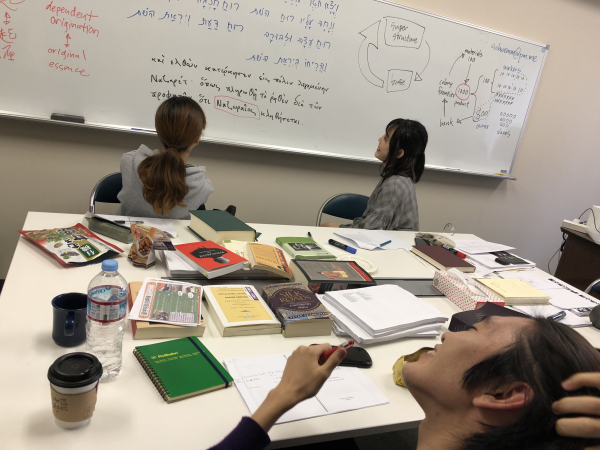人文学部ゼミブログ

2019.10.22
- 人文学部
- 英語英米文化学科
GSC Seminar: International Japanese Studies
ブログ投稿者:Patrick Schwemmer

No matter how complex or “high” a given cultural product is, the most meaningful and revealing thing about it will usually be its relationship to the material conditions that lie beneath it. When people put on a play, read a novel in a café, or look at a poster, what is happening in their blood vessels, their wallets, their rice fields? And yet, even the most baroque cultural ‘construct’ has very real consequences: as the chan/zen master Wumen Huihai says, cultural communication is 殺人刀,活人剣 “both a murderous blade and a life-giving sword” (Wumenguan 11). Accordingly, we find we have to deal with this dual relationship between materiality and culture, and here we are much helped by the image of history (found in Laozi, Zhuangzi, the zen tradition, Hegel) as a conversation between pairs of opposing forces, forces which are themselves constantly changing as they collide, fragment, and realign.
In this seminar, we choose materials based on student interest, and here we have found useful the concept of ideology as developed by the French philosopher Louis Althusser: for him, ideology is “a ‘representation’ of the imaginary relationship of individuals to their real conditions of existence.” Althusser is mainly interested in analyzing capitalist societies like our own, in which bankers finance entrepreneurs to start businesses, where they pay wages to workers, who sell their labor power to produce various goods, for which demand is manufactured by means of advertising, so that the goods may be sold on a market for a profit, and this profit is then reinvested to make more profit by means of various asymmetries: that between the worker’s wage and the sale price of the product, the different tax laws of various countries, etc. The ‘value in motion’, or capital, thus produced has been sweeping across the globe like a great tsunami since about the nineteenth century, so these relations of production are not eternal: they came into being at a certain point in time and did not exist before. Ideology, by contrast, is something we can find in many societies with many different ways of arranging work and property, because even in other societies, individuals have or had imaginary relationships to their actual conditions of existence: if thought ever corresponded perfectly with material reality, basic human consciousness would become impossible, and so we would be reduced to the status of automata or achieve enlightenment, depending on how one thinks of it, but in any case we would no longer be in the human condition.
With reference to the art and architecture of medieval Europe and the literature of Edo-period Japan, this year we have been reading poetry and short fiction from Japan’s modern empire, with a particular focus on things written by colonial subjects or in Japanese colonies like Korea, Taiwan, Manchuria, etc., as well as the neo-medievalist or anti-modernist novels of Umberto Eco. Professor Schwemmer has expertise in ancient Western literature like the Greek and Roman classical traditions and the Hebrew and Christian Bibles, as well as premodern Japanese and Chinese literature, and so one phenomenon we have been tracing in these works is a kind of “false antiquity” expressed by the Sino-Japanese word 偽古性. We have observed that when cultural agents try to claim or to impute belonging in a given community like a family, an ethnicity, or a nation, they often make transhistorical claims based on earlier time periods—but not as these eras actually existed (and as we can experience them by reading real premodern literature) but rather based on a fictional image of the past which is actually a part of the modern ideology: that is, a modern author’s imaginary relationship to her or his modern conditions of existence.
